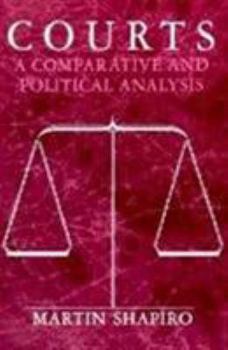Courts: A Comparative and Political Analysis
Select Format
Select Condition 
Book Overview
In this provocative work, Martin Shapiro proposes an original model for the study of courts, one that emphasizes the different modes of decision making and the multiple political roles that characterize the functioning of courts in different political systems.
Format:Paperback
Language:English
ISBN:0226750434
ISBN13:9780226750439
Release Date:October 1986
Publisher:University of Chicago Press
Length:256 Pages
Weight:0.05 lbs.
Dimensions:0.7" x 6.0" x 9.0"
Customer Reviews
1 rating
A Complex Look at the Nature of Courts
Published by Thriftbooks.com User , 18 years ago
Martin Shapiro's book, Courts: A Comparative and Political Analysis does a good job explaining the basis and theory behind courts by examining the traditional prototype of courts and evaluating and complicating it. Though Shapiro is a law professor discussing legal history and abstract concepts, he succeeds in structuring the book in a matter than makes it a difficult, but manageable read. Shapiro starts with the basic prototype of courts, and proclaims that this prototype does not truly fit any court system. He shows how courts developed from a basic triadic system of conflict resolution and than through the various chapters goes about showing the non-universal aspect of the prototype by examining a different, often historical, example of a clear violation of a point of the prototype. Shapiro shows how these variations develop and hence shows the complexity of what we think of as courts. A reader can take a lot away from this book beyond the basic argument. Shapiro shows complex ideas of legal history, for example, in the second chapter he explains much of the development of common law in England. This is interesting beyond the argument of the book and something that is often interesting and engaging. Though this book is full of often interesting history and theory, it is not necessarily full of that much practical information. Though one can learn about the basic concept of courts, they can not take that information out into the real world, even if the reader deals with the courts and legal system. It is a good academic exercise and a good theoretic explanation. I read this book for an undergraduate college course and it was good there, but not something one should read on one's own to take something independent away from it. Shapiro is a law professor and has a lot of complicated flexible ideas. That can make reading the book an occasional struggle to make it through the sometimes dull intricacy. Fortunately, Shapiro makes that easier for the reader by being a master of organization. There is never much of a question of where Shapiro is going and his main points are always summarized in the introduction and conclusion of each chapter. Though Shapiro sends the reader on a complicated and sometimes slow journey, he doesn't send her or him without a map. I recommend this book strongly in an academic setting. It is a helpful and honest analysis of the nature of courts that engages in explaining a exploring their complexity.





